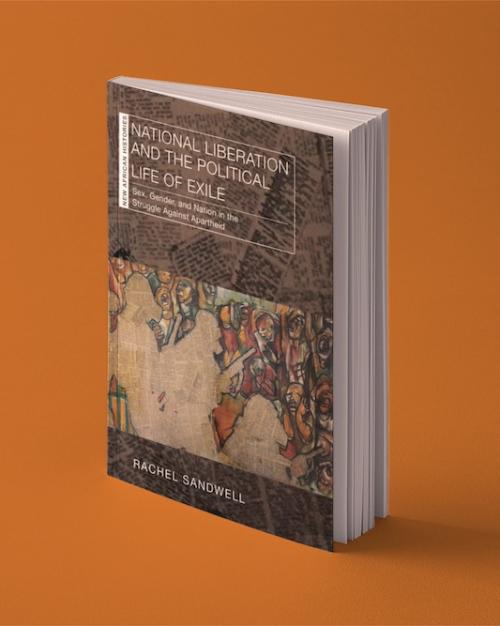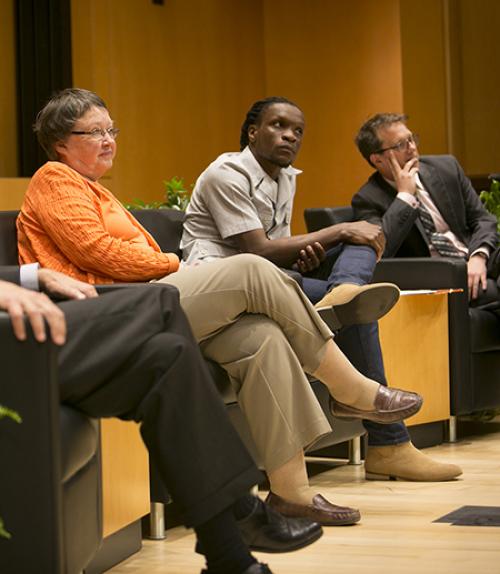“Me, my partner and [Flaubert’s] ‘Sentimental Education’ were on vacation in the south of France. And it wasn’t pretty,” said literary theorist Paul Fleming during the May 26 “Transformative Humanities: Faculty Reflections on Life-Changing Creative Works” panel celebrating the dedication of Klarman Hall.
Three faculty members shared encounters with great works in the arts and humanities, illustrating the essays they’d written for the Transformative Humanities project, in which faculty shared how these works have transformed their scholarship and their lives.
The panel in Klarman Hall’s Rhodes–Rawlings Auditorium featured poet Ishion Hutchinson, historian Mary Beth Norton and Fleming. Don Randel, Cornell professor emeritus of musicology, former dean of the College of Arts and Sciences, former Cornell provost and president emeritus of both the University of Chicago and the Mellon Foundation, served as moderator.
In his introduction, Randel recalled the first book he read as a boy that he knew changed his life – “How to Pitch” by Bob Feller – but said, “books by themselves don’t do the job. A book requires a reader who energizes it, who causes it to come to life.” He added, “my single greatest hope is that every student will leave knowing that they haven’t read enough and that they probably never will.”
Using humor and a dramatic narrative, Fleming recounted his frustration when reading “Sentimental Education” and how the protagonist “was driving [him] nuts.” His complaints transformed into praises when Fleming realized the book brilliantly demonstrated how literature “presents the world in its complexity without reducing it. It is an epistemology of people, psyches, society, politics – a complex grasping of the whole – presented in aesthetic form.”
The books one has read, said Fleming, professor of German studies and comparative literature and director of the Institute for German Cultural Studies, “become a cartographic image of oneself, a unique autobiography contained in the books one has read … each book marking a moment that shapes who you are.”
Hutchinson, assistant professor of English and the Meringoff Sesquicentennial Faculty Fellow, spoke about the inspiration for his poem, “Prelude to the Afternoon of a Faun.” He described how the “music of the poem arrived” in 2003 when he was in Kingston, Jamaica, and overheard flute music he could not identify coming through an open window.
Soon after, riots erupted in the city. “Singing gave way to screams; roads were blocked with debris and set on fire; explosions could be heard everywhere; students were tear-gassed by the university; the campus was put on lockdown; sirens blasted throughout the night; a national curfew was imposed,” Hutchinson said. He escaped despite the curfew, and it took 10 years before he tracked down the music of those flute notes – Claude Debussy’s “Prelude to the Afternoon of a Faun” – and he could at last shape his poem.
Norton, the Mary Donlon Alger Professor of American History, shared the influence of two poems on her scholarship. “The Gift Outright,” by Robert Frost, helped her understand Americans who remained loyal to Great Britain during the War of Independence, which was the subject of her dissertation.
Another poem, written in 1669 by Anne Bradstreet about the death of her much-loved three-year-old granddaughter, so moves Norton that in discussing it she had to pause to collect herself. The poem, she said, helped her understand how early Americans dealt with the fact that one-quarter of all children died before age one and close to half by age 21. Before encountering the poem, like other historians she suspected parents coped by keeping an emotional distance from their children. But Bradstreet’s poem showed the deep grief and pain of their loss, said Norton.
The Transformative Humanities project is part of the “New Century for the Humanities” celebration in honor of Klarman Hall’s opening. All of the essays contributed to the project are available on the College’s humanities website, which will be expanded as more essays are received.
Linda B. Glaser is a staff writer for the College of Arts and Sciences.
http://bit.ly/1XPD9p1http://bit.ly/1XPD9p1




